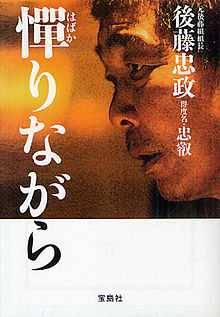Tadamasa Goto
Tadamasa Goto (後藤 忠政 Gotō Tadamasa, born September 16, 1942)[1] is a retired yakuza. He was the founding head of the Goto-gumi, a Fujinomiya-based affiliate of Japan's largest yakuza syndicate, the Yamaguchi-gumi.[2]
Goto, who has been convicted nine times at least,[2] was a prominent yakuza, who had even been dubbed the "John Gotti of Japan".[3] At one point he was the most powerful crime boss in Tokyo[4] and also the largest shareholder in Japan Airlines.[5]
He had been barred from entering the United States until 2001 when he got a special visa deal from the FBI.[6]
Career overview
According to his autobiography, Goto was born in Ebara, Tokyo, as the youngest of four brothers. After beginning of the Pacific War, of World War II, he moved to his father's hometown Fujinomiya, Shizuoka at age two when his mother died. He was raised by his grandmother and grew up in poverty.[7] After a period as a street thug in Fujinomiya, his yakuza career officially began in 1972, at age 30, when he joined a tertiary Yamaguchi-affiliate based in Fujinomiya.[8] Goto was rapidly promoted, and in 1985 he formed his own yakuza group, the Goto-gumi, in Fujinomiya as a secondary affiliate of the Yamaguchi-gumi.[1] He entered the Kobe headquarters of the Yamaguchi-gumi in its 4th era (1984–1985),[1] and had been in the headquarters until 2008 when he was expelled.[9]
FBI scandal
In 2001, after dealing with the FBI, he entered the United States to receive a liver transplant, and gave a $100,000 donation to the UCLA Medical Center in Los Angeles.[10] Goto got his new liver, from a queue-jumping transplant,[11] in the year when 186 people in the Los Angeles region died waiting for a liver.[6] Although the FBI would want some crucial information about the Yamaguchi-gumi's activities in the United States, Goto provided little useful information, according to a retired chief of the FBI's Asian criminal enterprise unit in Washington,[6] however it included a clue about some activities of Susumu Kajiyama the "Emperor of Loan Sharks".[12] Jake Adelstein, the journalist who uncovered the transplant story, received death threats.[13] When he was investigating the scandal for the Yomiuri newspaper, he had a formal meeting with mobsters associated with Goto, where he was told, "erase the story or be erased, your family too".[3]
Retirement
Goto began disappearing from the yakuza scene in 2008 after allegedly being forced into retirement by the Kobe headquarters' ruling faction led by Kiyoshi Takayama of the Kodo-kai.[14] His expulsion from the Yamaguchi-gumi was officially confirmed by the headquarters in October 2008.[15] After retirement, he became a Buddhist priest,[16] with his Buddhist name "Chuei" (忠叡).[17]

Book
Goto released his autobiography, Habakarinagara (lit. "while hesitating"), in May 2010. Habakarinagara had sold over 225,000 copies and went to number one in sales on various book-sales charts in Japan, including the Amazon.co.jp chart, by early 2011. All book royalties were donated to charity, Cambodia's "Angkor Association for the Disabled" and Myanmar's two Buddhist temples including "Mogok Vipassana Temple".[9] Angkor Association for the Disabled's official website has listed Goto as a major donor, with his Buddhist name "[Ven.] Chyuei [Gotou]".[18]
References
- ↑ 1.0 1.1 1.2 The Sixth Yamaguchi-gumi Complete Databook 2008 Edition : "Tadamasa Goto" (p.137–138), February 1, 2009, Mediax, ISBN 978-4-86201-358-3 (Japanese)
- ↑ 2.0 2.1 "Characteristics and Tendencies of the Goto-gumi Organization (from Japanese Government Agency Files)" Japan Subculture Research Center, by Jake Adelstein
- ↑ 3.0 3.1 "FBI helped Japanese gangster to have life-saving transplant in US", May 31, 2008, The Independent
- ↑ "Ties to the Yakuza Are No Laughing Matter", 26 August 2011, Jake Adelstein, The Atlantic Wire
- ↑ "First Person: ‘I don’t know if I’m still on a hit list’", June 12, 2010, The Financial Times
- ↑ 6.0 6.1 6.2 "Japanese gang figures got new livers at UCLA", May 30, 2008, Los Angeles Times
- ↑ Habakarinagara (p.14-15), 2010, Tadamasa Goto, Takarajima Publishing, ISBN 978-4-7966-8134-6 (Japanese)
- ↑ Habakarinagara (p.62-64), 2010, Tadamasa Goto, Takarajima Publishing, ISBN 978-4-7966-8134-6 (Japanese)
- ↑ 9.0 9.1 "Habakarinagara", 2011, Takarajima Channel (Japanese)
- ↑ "Tadamasa Goto gives up the gangster life", April 8, 2009, The First Post
- ↑ "Gangster boss who turned to God", April 10, 2009, The Independent
- ↑ "The dark side of the rising sun", June 15, 2008, Canada.com
- ↑ "Japanese underworld boss quits crime to turn Buddhist", April 7, 2009, The Guardian
- ↑ "Police's 'Yamaguchi-gumi Cleanup Operation' behind the O-zumo's 'Baseball Gambling'", July 1, 2010, Gendai Business (Japanese)
- ↑ "Tadamasa Goto gives up the gangster life", 8 April 2009, The Week UK
- ↑ "Yakuza boss reincarnated as Buddhist priest", April 9, 2009, Sydney Morning Herald
- ↑ "Habakarinagara by Tadamasa Goto (Buddhist name : Chuei)", 17 June 2011, Asahi.com (Japanese)
- ↑ "Donors" at the Wayback Machine (archived March 24, 2012), 8 February 2012, Angkor Association for the Disabled
Further reading
- Adelstein, Jake (11 May 2008). "This Mob Is Big in Japan". The Washington Post.